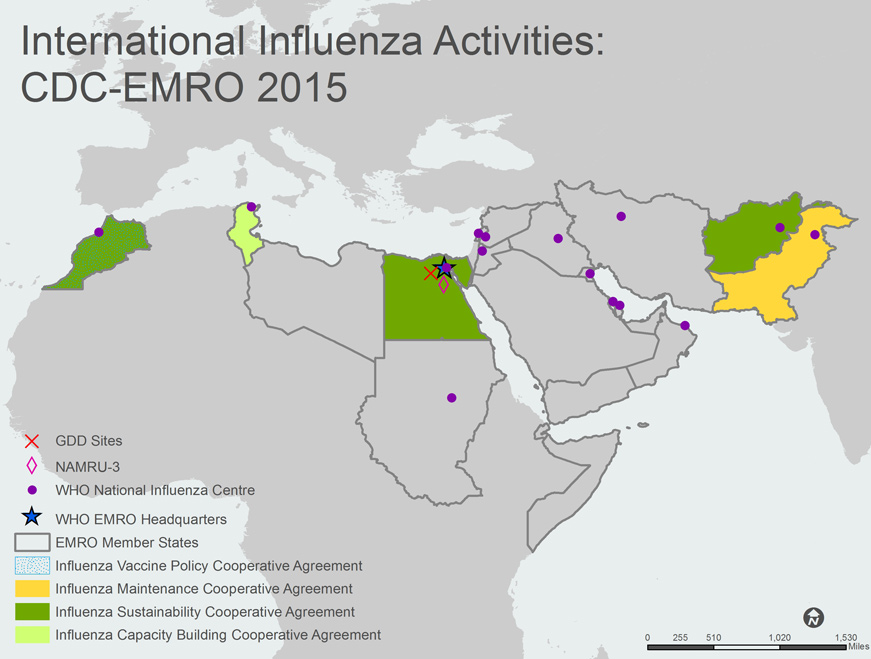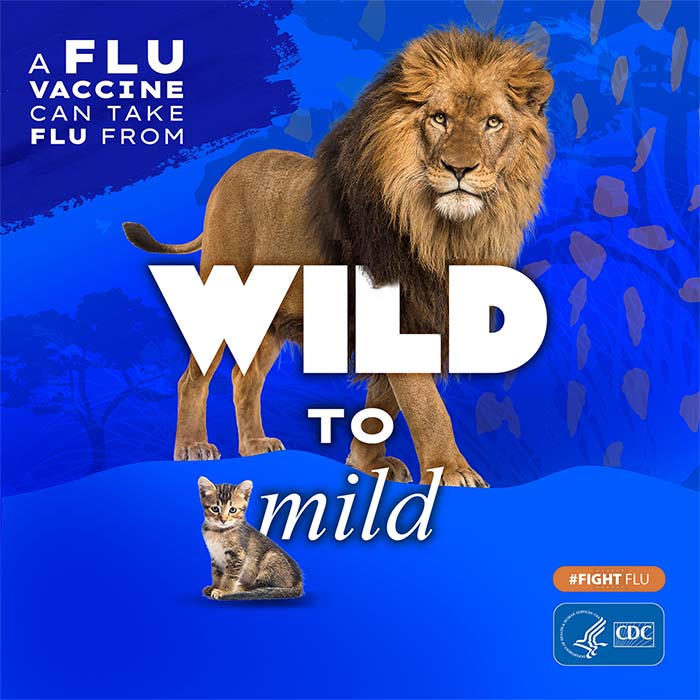WHO Eastern Mediterranean Region (EMR) 2014-2015
Currently there are five bilateral influenza cooperative agreements in the Eastern Mediterranean Region of the World Health Organization (WHO). These agreements are with ministries of health or institutions designated by the Ministry of Health (MOH) to work with CDC to build capacity to routinely identify, diagnose, and respond to seasonal and pandemic influenza across the Eastern Mediterranean Region.
Direct country support through non-research cooperative agreements is established in the following five countries:
- Afganistan [PDF – 28 MB]
- Arab Republic of Egypt [149 KB, 3 pages]
- Morocco [467 KB, 3 pages]
- Pakistan [153 KB, 2 pages]
- Tunisia [239 KB, 2 pages]
Two additional cooperative agreements were awarded for FY13, with work beginning in FY14. One additional capacity building cooperative agreement was awarded to Tunisia. Morocco was awarded a cooperative agreement for the development of influenza vaccine policy.
In addition, CDC supports the WHO Regional Office for the Eastern Mediterranean (EMRO) through a cooperative agreement.
The core activities of cooperative agreements and technical assistance between WHO/EMRO and CDC are:
- To enhance the quality, sensitivity and effectiveness of surveillance systems for influenza and severe acute respiratory infections (SARI) as well as sustaining and further enhancing the laboratory capacities of National Influenza Centers (NIC) for timely detection of novel influenza viruses;
- To develop the capacities of the countries to use routinely collected surveillance data to improve their understanding of influenza epidemiology to better inform the national health authorities on appropriate preventive and control strategies for influenza; and
- To support the development of appropriate public health policies that will promote the introduction and increased use of seasonal influenza vaccines in at-risk population groups in the region.
Meg McCarron, MPH
Health Scientist
Extramural Program
Influenza Division, NCIRD
U.S. Centers for Disease Control and Prevention
Atlanta, GA
Email: mmccarron@cdc.gov
Mark Thompson, PhD
Health Scientist
International Epidemiology and Research Team
Influenza Division, NCIRD
U.S. Centers for Disease Control and Prevention
Atlanta, GA
Email: mthompson2@cdc.gov

A map of the WHO Eastern Mediterranean Region (EMR) shows all 23 EMR member states/countries. The member countries, outlined with gray borders, include Afghanistan, Bahrain, Djibouti, Egypt, Iraq, Iran, Jordan, Kuwait, Lebanon, Libya, Morocco, Occupied Palestinian Territory, Oman, Pakistan, Palestine, Qatar, Saudi Arabia, Somalia, Sudan, Syria, Tunisia, United Arab Emirates and Yemen.
Countries with shading indicate that the Influenza Division provides project funding and technical assistance through cooperative agreements. Tunisia is shaded light green to indicate a Capacity Building Cooperative Agreement. Afghanistan, Egypt, and Morocco are shaded dark green to indicate Sustainability Cooperative Agreements. Pakistan is shaded yellow to indicate a Maintenance Cooperative Agreement. Morocco is also shaded with blue dots to indicate a Vaccine Policy Cooperative Agreement.
The Global Disease Detection [GDD] Site, indicated by the red “X”, is located in Cairo, Egypt. The Naval Medical Research Unit No. 3 (NAMRU-3), indicated by a pink diamond, is also located in Cairo.
WHO National Influenza Centers (NICs), indicated by a purple dot, are located in the following cities: Amman, Baghdad, Beirut, Cairo [2], Damascus, Doha, Islamabad, Kabul, Khartoum, Manama, Muscat, Rabat, Shaab, Tehran and Tunis.
The WHO Regional Office for the Eastern Mediterranean (EMRO), indicated by a blue star, is located in Cairo, Egypt.
- Established surveillance systems for severe acute respiratory infection/influenza-like illness (SARI/ILI) in 18 countries in the region.
- Recognized 16 National Influenza Centers in the region with varying capacities for influenza virus isolation, sequencing and antiviral resistance testing.
- Formalized the activities of the Eastern Mediterranean Acute Respiratory Infection Surveillance (EMARIS) network.
- Enhanced public health capacities for detection and diagnosis, investigation, and response to outbreaks of influenza A (H7N9) in the region.
- Developed guidance for surveillance of influenza in refugee and displaced population settings.
A five-year cooperative agreement on strengthening surveillance and response for seasonal and pandemic influenza in the Eastern Mediterranean Region of WHO began in September 2011 and is currently in its fourth year.
The WHO Eastern Mediterranean Regional Office (WHO/EMRO), based in Cairo, Egypt, serves 21 member states and one territory with an overall regional population of more than 538 million. Technical and financial support are provided to the countries through three main work streams: (i) enhancing the quality and sensitivity of the surveillance systems for influenza-like illness (ILI) and severe acute respiratory infection (SARI), (ii) developing the capacities of countries to use routinely collected surveillance data to improve their understanding of influenza epidemiology and (iii) supporting the development of appropriate public health policies that will promote introduction and increased use of seasonal influenza vaccines in at-risk population groups in the region. Guidance, standards and tools are regularly developed and shared with the countries for this purpose.
In accordance with the gaps identified during the 2009 influenza pandemic, the current support to WHO/EMRO is directed towards strengthening surveillance and response capacities of the countries in the region through establishing and enhancing sentinel surveillance systems for SARI and ILI.
The main goal of this support is to enable the countries to collect quality epidemiological and virological surveillance data on influenza and influenza-associated illnesses in a timely and reliable fashion. Surveillance information is also being used to better understand the circulation patterns of seasonal influenza viruses, including types and sub-types in the region, as well as the epidemiology of influenza, its seasonality and risk factors for severe disease. The evidence coming out of the surveillance data will be used to inform policy decisions regarding effective strategies for prevention and control of influenza in the region.
Surveillance Activities
- Conducted technical missions to Tunisia, Qatar, and Saudi Arabia to establish and/or enhance sentinel surveillance systems for SARI and ILI.
- Conducted a scientific consultative meeting on influenza at the animal-human interface in order to develop a strategic framework for joint risk assessment, surveillance, and response for zoonotic and novel influenza viruses.
- Conducted technical missions to Saudi Arabia during Hajj in 2013 and 2014 to advise on effective preparedness measures for preventing the international spread of influenza associated with the pilgrims.
- Conducted a sub-regional meeting in Amman, Jordan on improving preparedness for epidemic influenza in the region.
- Organized the second inter-country meeting of the Eastern Mediterranean Acute Respiratory Infection Surveillance (EMARIS) network in 2013 to review and evaluate SARI and ILI surveillance systems in the region.
- Extended technical support to Egypt and Pakistan during the winter of 2013–2014 to investigate the underlying causes of severe illness associated with influenza.
- Conducted a consultative meeting in Tunisia to develop guidance for surveillance of influenza in refugees and displaced populations.
There are 16 functional NICs in the region, and WHO/EMRO in close collaboration with the US Naval Medical Research Unit-3 (NAMRU-3) conducts periodic visits to all these NICs for assessment of their capacity to perform influenza virus sequencing, detect novel or unsubtypeable viruses, and test for antiviral susceptibility. Ten (63%) of the 16 NICs regularly participate in the WHO External Quality Assessment Project (EQAP). As a result of the support, eight NICs currently have full capacity for influenza virus sequencing and three NICs have full capacity for antiviral susceptibility testing. Work is currently underway to fully integrate the activities of the NICs with SARI surveillance in the countries, especially focusing on integrating epidemiological and virological data.
Laboratory Activities
- Conducted a training course in collaboration with NAMRU-3 for laboratory technologists on identification, detection, and diagnosis of influenza A (H7N9) virus for all countries in the region.
- Conducted technical assessment missions to the NICs in Afghanistan, Lebanon, and Sudan in order to enroll them in WHO’s EQAP.
- Conducted technical missions in collaboration with NAMRU-3 to Bahrain, Egypt, Jordan, Oman, and Morocco for periodic assessment of the capacities of NICs for sequencing of seasonal influenza viruses as well as to identify gaps in capabilities for molecular detection of novel respiratory viruses.
- Conducted a refresher training course in collaboration with NAMRU-3 on viral isolation for NICs in Afghanistan, Iraq, Lebanon, and Sudan.
Drawing on the institutional lessons learned during the 2009 influenza pandemic, public health preparedness for epidemic and pandemic influenza was strengthened in the region through technical and financial support from CDC. In-country rapid response teams have been established in 20 (91%) of 22 countries in the region and trainings have been provided to these teams for field investigation and response to epidemic and pandemic influenza.
A mechanism for country coordination and rapid information sharing was established throughout the region which links the work streams supported by the cooperative agreement with countries’ emergency operations centers and ministries of health.
Guidance, best practice documents and tools have been developed to assess and measure the severity of influenza, estimate the burden of influenza-associated hospitalizations, and develop supportive policies for introduction and increased use of seasonal influenza vaccines in the region.
Preparedness Activities
- Developed appropriate risk communication messages and related information products for high-risk groups.
- Deployed a rapid response mission in Egypt to assess the public health risk associated with the increase of human infections from influenza A(H5N1) virus.
- Conducted a regional workshop in Casablanca, Morocco on enhancing SARI surveillance for early detection, recognition, and response to influenza epidemics and other respiratory outbreaks.
- Deployed field missions to Libya, Jordan, Iraq, Palestine, Tunisia, and Kuwait during the winter of 2014 – 2015 to assess the public health risk associated with severe influenza infections.
WHO/EMRO in collaboration with the Member States organized the following sub-regional and national training courses:
- Rapid Response Training – focused on field investigations and response to outbreaks of influenza A (H7N9) virus in humans.
- Critical Care for Severe Influenza Cases Training (Egypt) – focused on standardizing critical care for the treatment of patients with severe viral pneumonia.
- Sub-regional Training (Oman) – focused on appropriate data collection, analysis, and field investigation techniques for surveillance and response to a respiratory outbreak caused by a novel influenza virus. Twenty-four participants from 11 countries attended.
- Sub-regional Training Workshop on Estimation/Measurement of Influenza Burden – focused on measuring the incidence of, and risk factors for, influenza using population SARI/ILI data. Fifteen participants from Egypt, Pakistan, Morocco, Oman, and Jordan attended this course.
Ezzeddine Mohsni, MD
Acting Director
Department of Communicable Disease Prevention and Control
World Health Organization
Eastern Mediterranean Regional Office
Cairo, Egypt
Email: mohsnie@who.int
Mamunur Rahman Malik, MD
Regional Advisor
Pandemic and Epidemic Disease
World Health Organization
Eastern Mediterranean Regional Office
Cairo, Egypt
Email: malikm@who.int
Ali Reza Mafi, MD
Medical Officer
Pandemic and Epidemic Disease
World Health Organization
Eastern Mediterranean Regional Office
Cairo, Egypt
Email: mafia@who.int
